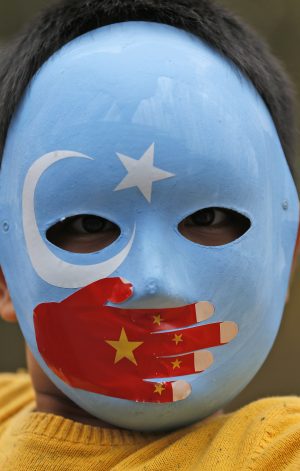On September 13, the U.S. State Department unveiled a new web page dedicated to cataloging the abuses against Uyghurs and other ethnic groups in China’s Xinjiang region. “The U.S. is committed to leading the global fight against these egregious human rights abuses,” the State Department said in a tweet.
The new page, titled “The Chinese Communist Party’s Human Rights Abuses in Xinjiang” is a standalone on the State Department’s website. It represents a new level in the U.S. response to highlight the plight of the Uyghurs – and, not coincidentally, discredit China on the international stage – following a steady drip of sanctions targeting Chinese officials and companies allegedly involved in human rights abuses against the Uyghurs and other largely Muslim Turkic ethnic groups.
The page outlines the basics of China’s campaign against Xinjiang’s Muslims, including sections on “Forced Population Control,” “Forced Labor,” and “Violations of Religious Freedom.”
“The Chinese Communist Party is waging a targeted campaign against Uyghur women, men, and children, and members of other Turkic Muslim minority groups in Xinjiang, China,” the page begins. “Documented human rights abuses include coercive population control methods, forced labor, arbitrary detention in internment camps, torture, physical and sexual abuse, mass surveillance, family separation, and repression of cultural and religious expression.”
“We call on the Chinese Communist Party to immediately end these horrific practices and ask all nations to join the United States in demanding an end to these dehumanizing abuses,” reads a banner quote from U.S. Secretary of State Mike Pomepo at the top of the page.
Beijing, predictably, dismissed the new page as “full of lies and rumors.”
“Xinjiang-related matters are China’s internal affairs that allow no foreign interference,” Foreign Ministry spokesperson Wang Wenbin said in a press conference on September 14, the day after the web page went live. “China once again urges the U.S. to stop political manipulation and interference in China’s internal affairs under the pretext of Xinjiang-related matters.”
Wang also ran down China’s usual checklist for denying accusations of human rights abuses – some say outright genocide – in Xinjiang: providing rosy statistics on economic prosperity in the region and Uyghur population growth over the past 40 years, coupled with an emphasis on the need for “counter-terrorism.”
“The counter-terrorism and de-radicalization measures taken by the Xinjiang local governments in recent years produced remarkable results, and the region hasn’t seen a single terrorist attack during the past 4 years or so,” Wang said, extolling the “stability and prosperity Xinjiang enjoys.”
Aside from these points, China’s general strategy for countering accusations of rights abuses in Xinjiang is to attempt to discredit the accuser – whether that means highlight the United States’ geopolitical interests in “containing China’s development under the pretext of human rights” or personally attacking Adrian Zenz, a leading researcher on the topic. Testimonies from former detainees are dismissed as “rumor” or “slander” (and indeed, are impossible to fully verify, thanks to the strict controls on travel and information flows in and out of Xinjiang).
But the documentation of abuses in Xinjiang goes far beyond the State Department or any individual researcher or survivor – reports have been issued by media outlets around the world, many of them based on satellite imagery or internal documents from the Chinese Communist Party and its apparatus in Xinjiang. In fact, some of the most dedicated activists calling attention to abuses in Xinjiang are not from the United States at all, but Kazakhstan.
The human rights abuses in Xinjiang are effectively an open secret at this point – but government action is only just starting to catch up.
Before this year, the United States was not especially outspoken about the Xinjiang human rights crisis. U.S. President Donald Trump himself has suggested that he chose not to pursue sanctions over the detention camps in Xinjiang because he did not want to risk jeopardizing negotiations over a trade deal. (Former National Security Adviser John Bolton offered a darker explanation, reporting that on two separate occasions Trump told Chinese leader Xi Jinping to “go ahead with building the camps, which Trump thought was exactly the right thing to do.”) Now, however, with U.S.-China relations a smoking wreck, Washington seems to have found its backbone on rights issues again, and has taken up the cause of the Uyghurs in earnest. The new State Department web page is a strong signal that the United States intends to continue to emphasize human rights violations in Xinjiang – and China will continue to vigorously counter with its own propaganda campaign.
There is plenty of room for cynicism about U.S. motives, particularly given the disdain toward Muslim populations within the Trump administration itself and the convenient geopolitics of highlighting China’s abuses, while very much turning a blind eye to, say, Saudi Arabia’s. The United States – particularly under the current administration – is a deeply imperfect champion for human rights. But few other governments have been willing to take concrete action against China for the now well-documented abuses in Xinjiang. If there is to be a “global fight” against the horrors taking place in Xinjiang, who else is going to lead it?

































